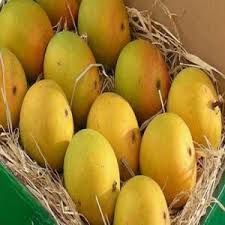 The British government on Thursday held talks with all the stakeholders to help lift the European Union ban on the import of Indian mangoes before the sanctioned date of December 2015.
The British government on Thursday held talks with all the stakeholders to help lift the European Union ban on the import of Indian mangoes before the sanctioned date of December 2015.
UK environment minister Lord de Mauley hosted a round-table meeting here with representatives of mango and vegetable importers and exporters from the UK and India, Deputy Indian High Commissioner to the UK Virendra Paul, and senior regulators from Defra and the Food and Environment Research Agency.
"The British government values the bilateral trade with India and is willing to support Indian regulators and the exporters and importers with technical assistance and collaborations with British regulators," said Lord de Mauley, parliamentary under-secretary of state for natural environment and science.
"The ability to overturn the ban is with the EU commission and such decision will be taken after the Food and Veterinary Office visit to India in September 2014.
The intention is to work with all the stakeholders to get the processes right so the ban sanctioned till December 2015 is lifted sooner," he said.
The meeting at the Department of Environment, Food and Rural Affairs was also attended by the representatives from National Asian Business Association, Confederation of Indian Industry, Federation of Indian Chambers of Commerce, Fresh Produce Consortium.
During the meeting, Defra agreed to facilitate discussions between the European Commission and Indian regulators about the changes required to enable the ban to be lifted.
It also agreed to provide training and technical advice to the Indian authorities and exporters in EU phytosanitary procedures and certification requirements, both in the short term, as they prepare for the FVO visit in September and in the longer term.
The Indian and UK industry representatives, led by Monica Bhandari of Fruity Fresh (Western) Limited, highlighted the sudden nature of the ban and the impact it has had on small and medium enterprises in the UK and in India, from the growers and farmers, to exporters and importers and small high street retailers.
Bhandari said: "This meeting has been a positive step forward, with Lord de Mauley and his team agreeing to facilitate positive discussions and action on this issue.
"We hope that with the help of Fera and Defra and measures put in place by the Indian authorities, we will be able to achieve
Gunveena Chadha, director and head of CII in the UK, said: "EU authorities ban on imports of Indian mangoes without any meaningful official consultation with India has raised severe concerns in India.
"While the government authorities in India have already implemented a new system to improve certificates and standards and experts are looking at options of hot water dipping treatment to manage contamination of the fruit, the Industry is of the view that this treatment affects the taste of the fruit.
"Besides, the cost of infrastructure required for this treatment is prohibitive especially for small exporters. CII suggests bilateral consultation between EU and India as the way forward to work out a proper mechanism to deal with the problem."
Sidharth Birla, president of FICCI, added: "The ban imposed by the EU on the import of selected fruits and vegetables from India was an unfortunate development.
“We welcome the talks with the UK government to deal with such a situation through discussion.
"In particular, we welcome the willingness to provide technical assistance to Indian exporters where required and put a renewed emphasis on clear communication channels."
At the meeting, Defra discussed the increasing levels of infestation and interventions that took place in 2013 and detailed the requirements from the Indian export supply chain and regulatory authorities for improving phytosanitary certification.
It was indicated that the ban was put in place as the EU did not find sufficient improvement in phytosanitary certification and regulatory measures by the end of 2013.
The UK imports around 6.3-million pounds worth of Indian mangoes per year out of a UK mango market worth 68 million pounds in total.
Non-European food pests were found in 207 shipments of fruit and vegetables in 2013.
The ban also includes aubergines, two types of squash, and a type of leaf called patra used in cooking and has triggered worldwide protests, with an online e-petition urging the EU to reverse the decision.
Indian-origin MP Keith Vaz raised the issue with British Prime Minister David Cameron in the House of Commons earlier this month and was assured that he would discuss the issue with the new Indian PM, Narendra Modi.
A Downing Street spokesperson said the matter is likely to come up in talks in "due course".










